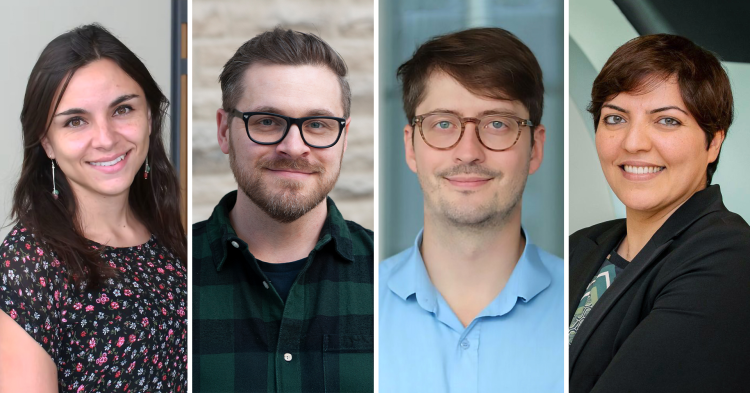Four early-career Western researchers are advancing projects to help find solutions for pressing problems across the province. Liliana Alvarez, Thomas DeFalco, Yalda Mohsenzadeh and Lyle Muller have been recognized with the Ontario government's Early Researcher Awards.
Winners were chosen based on the overall quality of their proposals, in addition to the scientists' research excellence, success in cultivating new talent and the potential benefits their research will bring to Ontario.

The highly competitive program provides $100,000 over five years from the province, with an additional $50,000 coming from Western. The funding helps promising Ontario researchers access the latest technologies, equipment and talent to build teams that will advance their research projects.
Liliana Alvarez
Alvarez is a professor in the School of Occupational Therapy in the Faculty of Health Sciences and director of the i-Mobile Driving Research Lab. Her research examines the personal, social, economical, political and environmental factors that affect the mobility of at-risk populations, including their fitness to drive and driving performance.
Liliana Alvarez
Project funded by Early Researcher Awards
For the last 30 years, motor vehicle collisions have been the leading cause of death for Canadians between the ages of 15 to 24. Driving impaired by alcohol or drugs is a major contributing factor to these fatalities.
While decades of prevention strategies have helped reduce alcohol-impaired driving, the number of young people driving under the influence of cannabis (DUIC) is on the rise. Alvarez said the understanding of the risk factors for drivers up to age 24 is complicated by the underrepresentation of racialized young Canadians in cannabis-related research, and their overrepresentation in police surveillance and drug enforcement.
Her research, with the guidance of a youth collaborative board, will examine their experiences to improve the effectiveness of DUIC interventions aimed at young people, without perpetuating stigmatizing views.
"By focusing on the individual and social DUIC determinants of racialized Ontario youth that were previously overlooked, my findings will inform future collaborative youth-led DUIC interventions," she said. "Understanding what influences youth DUIC will help us to stop it."
Thomas DeFalco
DeFalco is a molecular biologist and professor in the department of biology in the Faculty of Science. He leads the DeFalco Lab at Western that studies how plants sense and respond to their environment at the molecular level.
Project funded by Early Researcher Awards
To survive, plants must sense and respond to their environment using receptor kinases (RKs) on their cell surfaces. These RKs perceive extracellular stimuli, then activate intracellular signal pathways to trigger growth, development, reproduction, immunity and abiotic stress responses.
While many RKs have been identified, the signalling mechanisms downstream of most RKs remain unknown. DeFalco's research aims to fill that gap of critical knowledge needed to further develop improved traits in crops.
The DeFalco Lab is using a multidisciplinary approach to study how RKs trigger specific responses to extracellular stimuli. The research aims to understand the mechanisms and then apply the knowledge to creating new signaling circuits in plants, especially in relation to their immunity and development.
"We seek to identify novel components and engineer improved stress tolerance and disease resistance in crops, addressing critical issues in agriculture and food security," DeFalco said.
Yalda Mohsenzadeh
Mohsenzadeh is a professor in the department of computer science in the Faculty of Science. Her Cognitive Neuroscience & Artificial Intelligence Lab is developing brain-inspired computational models that reveal how we perceive, remember and think, advancing innovations in health, education and technology.
Project funded by Early Researcher Awards
Ontario faces an alarming rise in dementia cases, with a projected 202 per cent increase from 2020 to 2050, totaling about 2.9 million new cases - the highest number of new cases in Canada. Mohsenzadeh's research could help improve support for people with memory impairments by understanding why certain images are more memorable than others - a phenomenon called image memorability.
By combining advanced AI with cognitive neuroscience, her team seeks an understanding of the brain signals that predict image memorability and how these processes can be influenced. Understanding how the brain remembers images can inform the development of strategies for dementia care while also improving overall mental health outcomes, Mohsenzadeh said.
"The surge in dementia cases highlights the urgent need for advanced research into human memory and innovative solutions to tackle this public health crisis," she said. "This research can contribute to significant advancements in mental health care and enhance the quality of life for countless Ontarians."
The research also has applications in education and media by creating better learning tools for students, Mohsenzadeh added.
Lyle Muller
Muller is a professor in the department of mathematics in the Faculty of Science and leads the Fields Institute Lab for Network Science. He is part of a team of applied mathematicians and neuroscientists who investigate how the spatiotemporal patterns of brain activity create our perceptions, thoughts and memories.
Project funded by Early Researcher Awards
Imagine the human brain as a network of cities, each responsible for storing different aspects of the same memory. During sleep, these "cities" exchange resources to retain the most important memories from the day. Muller's recent work revealed that these "cities" do not activate simultaneously - they turn on and off in a complex wave of communication. His research is examining how these waves of communication help to store memories across the brain.
Muller is collaborating with a team of neurologists and neurosurgeons at London Health Sciences Centre (LHSC). In the neurosurgery clinic, the team will ask test subjects to learn how to navigate through a virtual reality environment. Then, as the subjects sleep, the team will study recordings to map traveling brain waves with high detail. The analysis uses new computational algorithms Muller developed.
Muller says the collaboration between Western and LHSC will further establish them as internationally recognized leaders in computational neuroscience and memory research, while boosting the regional economy.
"Both the applications of this research and the training of highly qualified personnel during this work will directly benefit Ontario's knowledge economy and its growing neurotechnology sector," he said.










